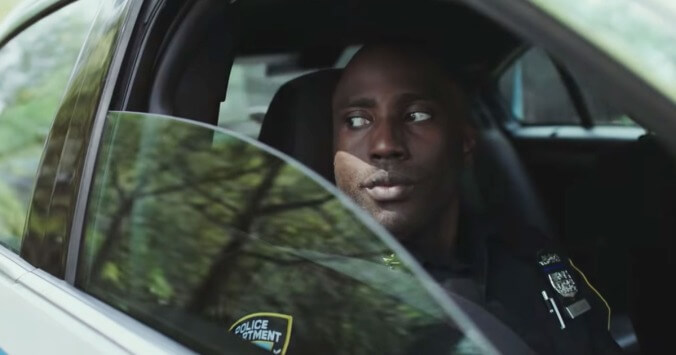Police brutality takes many different forms in the quietly powerful Monsters And Men

The public policy around police-involved shootings of unarmed African-Americans hasn’t progressed much since civil unrest in Ferguson, Missouri pointed klieg lights at the issue four years ago. In the same period, the Black Lives Matter movement has precipitated enough scripted content to occupy its own bleak cinematic universe, with recent entries including the surprisingly playful Blindspotting and George Tillman Jr.’s adaptation of the YA hit The Hate U Give. And then there’s the meditative Monsters And Men, which explores the same explosive subject matter, but with a subtlety and quietude that sets it apart from its thematic peers—occasionally to a fault.
Monsters takes place in an unspecific Manhattan neighborhood somewhere north of the 130s. Sense of place is vitally important to a zeitgeist-driven film like this one, but writer-director Reinaldo Marcus Green compensates with temporal specificity. The film is set in the aftermath of a hashtaggable officer-involved shooting, a tense situation exacerbated by a quasi-retaliatory ambush on a pair of NYPD officers. Save for the names and a few key details, the story mimics the death of Eric Garner, who died from a chokehold after officers confronted him for peddling loose cigarettes. Garner died in July 2014, nearly a year to the day after Fruitvale Station hit theaters. By year’s end, the officers involved in Garner’s death had dodged indictments, while two unrelated officers had been killed in a deranged act of protest.
In Monsters, the strange fruit is Darius Larson (Samel Edwards), a Garner-type gentle giant with the same corner hustle, which barely qualifies as a nuisance crime let alone a capital offense. Darius is only seen in glimpses before the police engagement that ends his life, and he’s mostly off-screen even during his death. Instead, the camera is fixed on the anguished face of Manny (Anthony Ramos), one of three characters Green uses to reflect the overall pulse of the neighborhood. Manny uses his cell phone to capture the best objective account of the incident, which, in this film à clef, involves a gunshot rather than a physiologically ambiguous chokehold. His story follows the contours of real-life events, as the embattled officer’s crooked colleagues close ranks around him.
Outside of Manny, Monsters becomes more abstract as it considers the event through the lens of the other two characters who represent different sides of the debate. John David Washington plays Dennis, an NYPD beat cop assigned to the same uptown Manhattan anyhood where Darius sells his loosies and Manny shoots dice on the sidewalk. Washington, fresh off his role in Spike Lee’s BlacKkKlansman, assumes the identity of another black law enforcement officer negotiating an extreme form of double consciousness. He’s the most recognizable actor in the film, which might explain the decision to give him a cold open, a scene in which Dennis gets pulled over by a white patrolman and flashes his badge to ensure reasonable treatment. Following the title card, Dennis vanishes while Manny becomes the focal point. By the time Dennis reappears, Manny’s footage of Darius’ final moments has gone viral, forcing him to reevaluate his role on the force and pacify his conflicted wife, Michelle (Nicole Beharie).
Dennis eventually cedes the focus to Zyric (Kelvin Harrison Jr.), the widest ripple from Darius’ death. He’s a young, elite athlete trying to shut out the world and focus on securing a baseball career, only to find his focus drifting back toward Darius. His potential as a baseball player is, after all, irrelevant if he’s not sure he’ll live to see the draft. Zyric’s portion of the film is the most potent, perhaps because the character was already formed, having been previously harassed by the cops in Green’s 2015 short film, “Stop.” His relative distance from the fatal incident makes his mortal dread that much more poignant, especially when he’s made so many good choices thus far in his young life. Kudos is due to Harrison, who brings the same saucer-eyed vulnerability he brought to his role in It Comes At Night, where he played another kid forced too soon to grapple with his mortality.
The three men share more than marginalization as men of color and complex relationships with law enforcement. They’re linked by a sense of duty. “This job is not a choice,” Dennis tells his anguished wife, an attempt to obviate a perennial debate about a career change. Manny is similarly freighted with duty when he documents Darius’ death over police objections, as is Zyric when he defies his father to lend himself to the subsequent protests. Green treats his characters as equals, framing them all with intimate, low-angle follow shots and tight close-ups, and neatly compartmentalizing their stories. The even-handed approach reinforces the idea that each man’s pain deserves to be acknowledged despite their different stations in life.
The narrative egalitarianism is part and parcel of Green’s restrained approach. His sensitivity, particularly around Darius’ death, is a welcome change following years of viral snuff videos of police shootings and lurid entries like Kathryn Bigelow’s Detroit. But his choice to trisect the story results in a film that can feel too measured and dispassionate for a subject matter that practically demands polemics. Green’s graceful direction and keen ear for dialogue certainly make him a new filmmaker to watch, and it’ll be fascinating to see what he does with a more focused narrative. On the other hand, the film’s design evokes the experience of following the news about shootings of unarmed citizens. Just when you’ve started to care about one victim, another one comes along to pull focus.